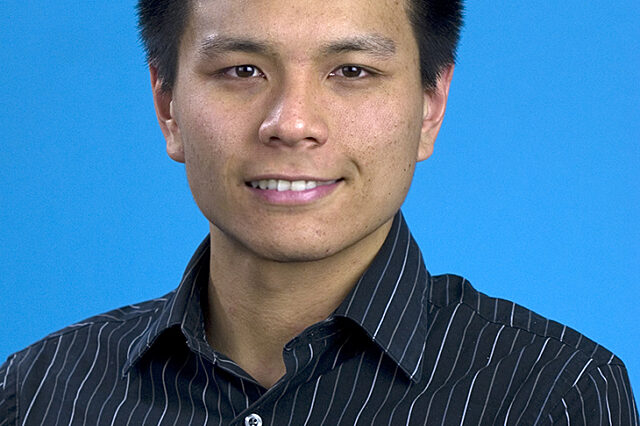Small animal surgeon receives UF veterinary college’s top teaching award

Stanley Kim, B.V.Sc., an assistant professor of small animal surgery, has received the University of Florida College of Veterinary Medicine’s 2017 Zoetis Distinguished Veterinary Teacher Award.
Kim was selected based on criteria that included peer and student evaluations; quality of teaching and impact on student learning; and teaching-related research, service and publishing activities.
In 2016, he played a key role in helping to develop a synthetic canine cadaver now used in UF veterinary surgery labs as an alternative to canine cadavers and live animals.
“My unparalleled enthusiasm for Dr. Kim’s contributions to veterinary medical teaching this year is for the part he played in training our students in the use of the new synthetic canine technology,” said Kim’s department chair, Rowan Milner, B.V.Sc., Ph.D., who nominated him for the award.
In mid-2016, the college engaged in talks with SynDaver Labs, manufacturer of the synthetic canine models. Kim and his colleague, Brad Case, D.V.M., who also is an assistant professor of small animal surgery at UF, provided essential information that was used to develop a comprehensive, anatomically accurate model that veterinary medical students could use in surgery courses as an alternative to canine cadavers and live animals.
UF veterinary medical students were the first in the world to use the new technology in Kim’s surgery lab last fall.
“Simulation is the way of the future for surgical training in both the human and veterinary fields, and in helping to develop and teach with this model, we at UF are leading the way in simulation veterinary surgery,” Milner said. “Our students are lucky to have this opportunity, due in large part to Dr. Kim’s dedication and efforts. The students have reported they were thrilled to have the opportunity and found the models beneficial for their training because all of the typical pressures of surgery are mitigated.”
Kim also teaches small animal orthopaedics to junior- and senior-level veterinary medical students performing their clinical rotations. He is a mentor to graduate students and research fellows through an active research program that covers a range of orthopaedic issues. In addition, Kim supervises and instructs small animal surgery residents in the UF Small Animal Hospital and coordinates the college’s summer student research program.
“I enjoy seeking opportunities to enhance my teaching abilities through technology,” Kim said.
A board-certified small animal surgeon, Kim is a graduate of the University of Sydney’s veterinary science program. He completed an internship in small animal medicine and surgery at Ontario Veterinary College in Guelph, followed by a residency in small animal surgery at UF, which he completed in 2010 prior to joining the college’s faculty in 2011.
“I believe that the best teachers have a strong desire to continually evolve one’s teaching methods,” Kim said. “I hope to continue improving my approach to teaching throughout the course of my entire career.”
In 2016, Kim received the Small Animal Clinical (Core) Teacher of the Year Award from the graduating class, as well as the college’s C.E. Cornelius Young Investigator Award, given each year to acknowledge the contributions of a young faculty member to the advancement of knowledge in an area of biomedical research.
The University of Florida College of Veterinary Medicine is supported through funding from UF Health and the UF Institute of Food and Agricultural Sciences.
About the author
